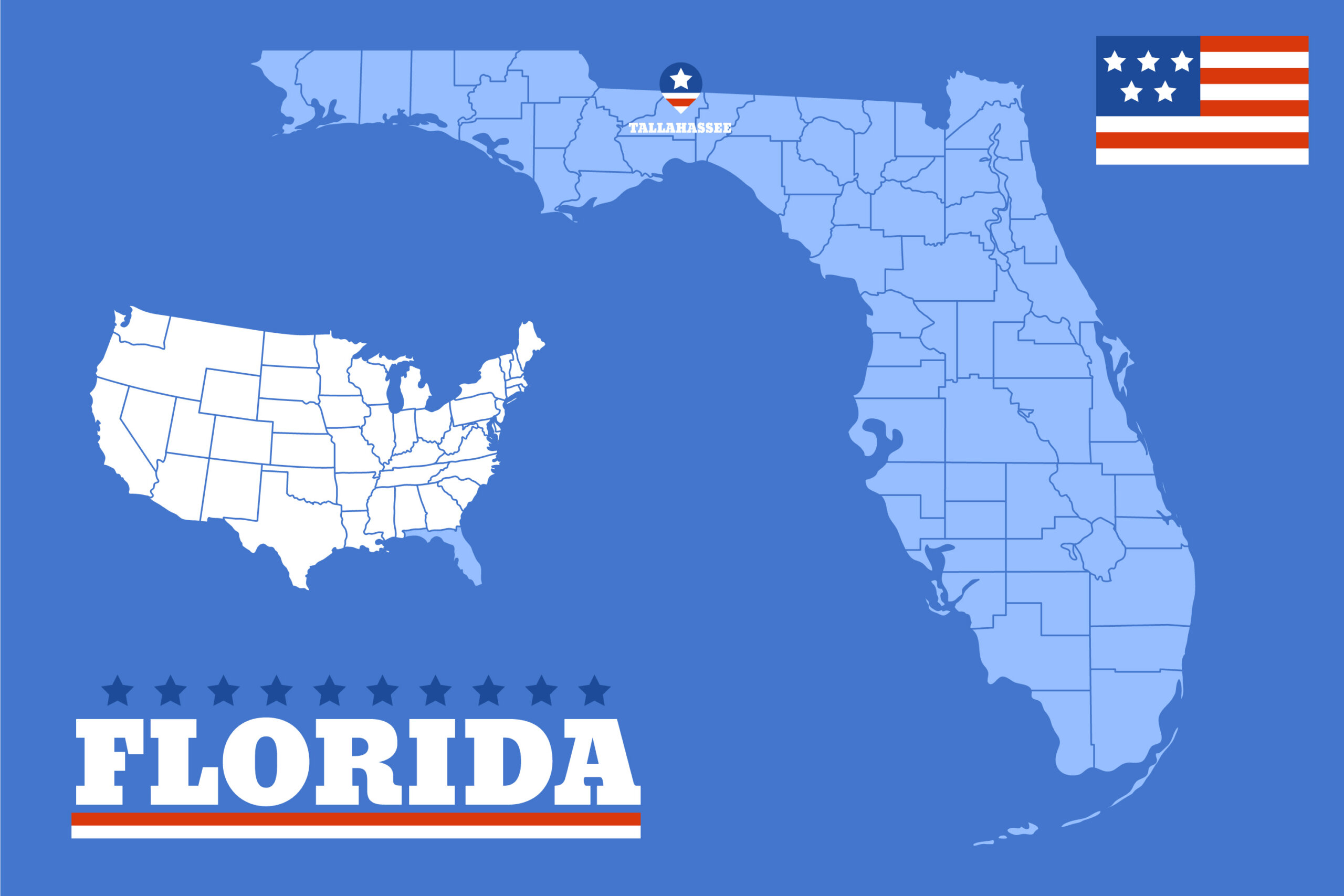10 New Florida Laws 2025: Key Changes You Need to Know
In 2024, Florida lawmakers passed more than 200 new state laws, with many taking effect in July or October. However, nearly a dozen new laws have taken effect in 2025, including a social media ban for children, a law improving safety for first responders on duty, and a bill reforming dental insurance claims. The key highlights of these new acts include:
- Social Media Restrictions for Minors
- Age Verification for Adult Websites
- Voter Registration Applications
- Protections for First Responders
- Building Regulations
- Medical Treatment Under Florida Workers Compensation Statute
- Protection of Specified Adults (the Elderly and Vulnerable)
- Dental Insurance Claims
- Florida Uniform Fiduciary Income and Principal Act
- Confidentiality in Investigations
- Private Activity Bond Improvements
Although some of these legislations represent minor amendments and have not faced much opposition, others have generated some controversy, with one already facing challenges in court.
Let’s take a look at some of the new laws.
HB 3: Social Media Restrictions for Minors and Age Verification for Adult Websites
This law blocks children under 14 from creating or accessing a social media account and parental consent is required for 14 or 15-year-olds to have an account. The legislation also requires adult websites to use age verification measures to prevent minors from accessing them. The goal of the legislation is to protect minors from potential online harm and related mental health effects.
Social media companies will have to terminate any accounts found to belong to a user under the age of 14 or face fines of up to $50,000. Account holders will be granted 90 days to contest the termination of an account. The law defines “social media” as any online platform that possesses particular traits, such as allowing users to upload content or view the content of others, using algorithms to analyze user data, and offering addictive features like “infinite scrolling,” among others. The law also targets social media sites with at least 10% of daily users under the age of 16 spending at least two hours per day over the previous year.
Although the age verification portion of the bill has already gone into effect, the social media aspect of HB 3 is on hold pending a court decision in U.S. District Court that is expected to weigh in on the law’s First Amendment implications.
HB 135: Voter Registration Applications
This new law amends the state’s voter registration application statutes to specify that a voter’s party affiliation may not be changed unless the voter agrees to the change in writing.
This change is a response to reports by some voters that a “glitch” in the Department of Highway Safety and Motor Vehicles’ software changed their status to the default “No Party Affiliation” when they renewed their driver’s licenses.
HB 184: Protections for First Responders
Under this legislation, approaching within 25 feet of a first responder performing their duties is illegal after the person has received a warning. The purpose of the law is to prevent harassment, threats, or intimidation of first responders. After a warning to back off, the offender must move at least 25 feet away from the first responder or face a second-degree misdemeanor charge.
HB 267: Building Regulations
This bill aims to amend the state’s building code to accomplish several goals. First, it implements time limits for local governments to approve or deny permit applications. Effective January 1, local governments must approve or deny most permits for structures up to 7,500 square feet within 30 days and within 60 days for larger buildings. It also requires local governments to develop auditing standards before auditing a private provider.
The law also eliminates the requirement for sales drawings by a design professional for the replacement of windows, doors, and garage doors. The goal of this measure is to streamline the permitting process by requiring less paperwork between customers and contractors.
SB 362: Medical Treatment Under Florida Workers’ Compensation Statute
This senate bill increases limits on witness fees for health care providers who give depositions in workers’ compensation cases from $200 to $300 per hour. It also increases the maximum reimbursement rates for physicians from 110% to 175% of the reimbursement amounts allowed by Medicare. Reimbursement rates for surgical procedures has been increased from 140% to 210% of amounts allowed by Medicare.
SB 556: Protection of Specified Adults
The goal of this law is to prevent the exploitation of the elderly and other vulnerable adults. Under this law, financial institutions may delay disbursements or transactions for up to 15 days if they suspect foul play, such as using a power of attorney, guardianship, or conservatorship to fraudulently exploit people over the age of 65 or those with particular vulnerabilities. The aim is to increase protection for people who are common targets for scammers.
SB 892: Dental Insurance Claims
This law prohibits health insurers in Florida from charging extra fees to pay dentists through Automated Clearing House (ACH) transfers unless the dentist consents. It also prevents insurers from mandating credit card payments as the only acceptable method for payment. It also prohibits insurers from denying claims for procedures included in a prior authorization. The aim of the legislation is to expand coverage for authorized claims and minimize hassle for dentists.
HB 1093: Florida Uniform Fiduciary Income and Principal Act
This bill was introduced to update and modernize the Florida Uniform Principal and Income Act (FUPIA), which governs the allocation of receipts and disbursements between principal and income for trusts and estates, especially when a Florida trust doesn’t provide its own terms for allocation. The amendment allows fiduciaries to use total-return investing strategies under the “modern portfolio theory,” allowing for more contemporary and flexible investment approaches when managing trusts and estates.
HB 1491: Confidentiality in Investigations
This bill is linked to HB 3 and establishes public record guidelines designed to prevent the public disclosure of information involving investigations by the Department of Legal Affairs, particularly those involving certain social media violations, until the investigation is completed or resolved. The public record exemptions include personal information, computer forensic reports, information that would reveal weaknesses in data security, and information that would disclose proprietary information.
SB 7054: Private Activity Bond Improvements
This bill revises laws related to private activity bonds with an intent to increase the number of such bonds that can be issued in Florida each year to finance “improvements, projects, and programs” that serve public purposes. It mandates that the Division of Bond Finance of the State Board of Administration determine the state’s volume limitation annually and make this information available to the public.
FAQ’s
What is the New Florida Law on Workers’ Compensation?
SB 362 increases witness fees for health care providers in workers’ compensation depositions from $200 to $300 per hour and raises reimbursement rates for physicians and surgical procedures to 175% and 210% of Medicare allowances, respectively, ensuring fair compensation and better care for injured workers.
What is the New Florida Law Regarding Social Media?
HB 3 bans social media access for children under 14, requires parental consent for 14- and 15-year-olds, and mandates age verification for adult websites. Social media companies face fines of up to $50,000 for noncompliance, though the social media portion is on hold pending a court ruling.
What New Laws Involve Depositions in Florida?
SB 362 increases deposition witness fees for health care providers in workers’ compensation cases, while HB 1491 protects confidential information in investigations, including social media violations, until cases are resolved.

 BACK TO BLOG
BACK TO BLOG
